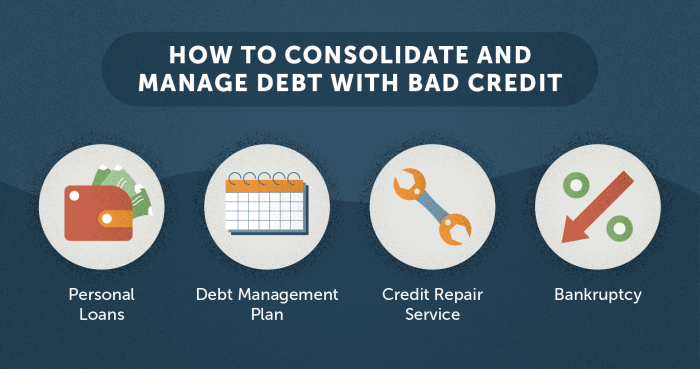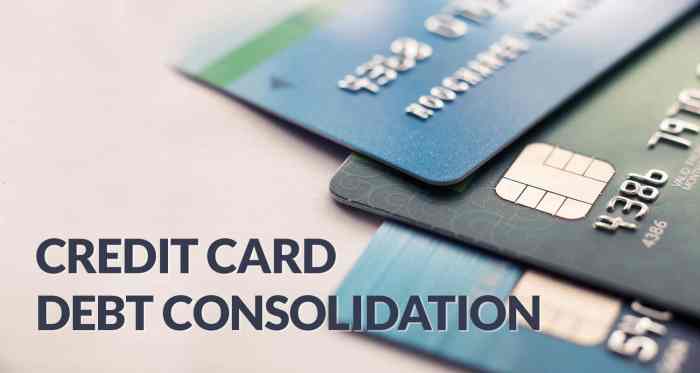Exploring Credit Card Debt Consolidation: A Comprehensive Guide
Delve into the world of credit card debt consolidation, where financial strategies meet opportunity. Discover the ins and outs of consolidating debt and how it can pave the way to a debt-free future.
Uncover the various methods, factors to consider, and alternatives in the realm of credit card debt consolidation. Let's navigate this financial landscape together.
What is credit card debt consolidation?

Credit card debt consolidation is a financial strategy that involves combining multiple high-interest credit card balances into a single loan with a lower interest rate. This can help borrowers simplify their payments and potentially save money on interest over time.
How credit card debt consolidation works
Credit card debt consolidation typically involves taking out a personal loan, balance transfer credit card, or utilizing a debt consolidation program to pay off existing credit card debts. By consolidating debt, borrowers can streamline their payments into one monthly installment, making it easier to manage and potentially reducing the total amount paid over time.
- Personal Loan: Borrowers can apply for a personal loan from a bank or online lender to pay off their credit card debts. The personal loan will have a fixed interest rate and repayment term, providing a clear timeline for debt repayment.
- Balance Transfer Credit Card: Some credit card companies offer balance transfer cards with introductory 0% APR periods. Borrowers can transfer their existing credit card balances to this new card, allowing them to pay off the debt without accruing additional interest during the promotional period.
- Debt Consolidation Program: Debt consolidation companies can work with borrowers to negotiate lower interest rates and create a repayment plan that fits their budget. Borrowers make one monthly payment to the consolidation company, which then distributes the funds to creditors.
Benefits of credit card debt consolidation
Credit card debt consolidation offers several benefits to borrowers, including:
- Lower Interest Rates: By consolidating high-interest credit card debt into a single loan with a lower interest rate, borrowers can save money on interest over time.
- Simplified Payments: Managing multiple credit card payments can be overwhelming. Debt consolidation streamlines payments into one monthly installment, making it easier to keep track of and budget for.
- Reduced Stress: Dealing with debt can be stressful. Credit card debt consolidation can help alleviate some of that stress by providing a clear plan for repayment and potentially lowering monthly payments.
Methods of credit card debt consolidation

When it comes to consolidating credit card debt, there are several methods available to help individuals manage and pay off their balances more effectively. Let's explore the different options and weigh the pros and cons of each approach.
Balance Transfers
- Balance transfers involve moving high-interest credit card debt to a new credit card with a lower interest rate.
- Pros:
- Can potentially save money on interest charges
- Simplify payments by consolidating debt onto one card
- Cons:
- May come with balance transfer fees
- Introductory interest rates may increase after a certain period
Personal Loans
- Personal loans are unsecured loans that can be used to pay off credit card debt.
- Pros:
- Fixed monthly payments for easier budgeting
- Potentially lower interest rates compared to credit cards
- Cons:
- May require good credit to qualify for favorable terms
- Adding another loan to your financial obligations
Debt Consolidation Loans
- Debt consolidation loans are specifically designed to combine multiple debts, including credit card balances, into a single loan with a lower interest rate.
- Pros:
- Simplify debt repayment with a single monthly payment
- Lower interest rates than credit cards in many cases
- Cons:
- May require collateral for larger loan amounts
- Potentially longer repayment terms, leading to more interest paid over time
Factors to consider before consolidating credit card debt
When considering credit card debt consolidation, there are several important factors to take into account to make an informed decision that suits your financial situation. Factors such as credit score, interest rates, and fees play a crucial role in determining the effectiveness of debt consolidation options.
Credit Score
Your credit score plays a significant role in determining the feasibility of debt consolidation. A higher credit score usually means you qualify for better interest rates and terms. If your credit score is low, you may have limited options for debt consolidation or end up with higher interest rates, which could defeat the purpose of consolidating your debts.
Interest Rates
One of the primary reasons for consolidating credit card debt is to secure a lower interest rate than what you are currently paying. Before opting for debt consolidation, compare the interest rates offered by different lenders or programs. Ensure that the new interest rate will help you save money in the long run and make your payments more manageable.
Fees
It's essential to consider any fees associated with debt consolidation, such as balance transfer fees, origination fees, or prepayment penalties. These fees can add to the overall cost of consolidating your debt and may impact the savings you expect to achieve.
Be sure to calculate the total cost of consolidation, including any fees, to determine if it is a cost-effective solution for you.
Choosing the Right Option
To choose the right debt consolidation option based on your individual circumstances, consider factors like your credit score, the interest rates offered, and any fees involved. Evaluate your current financial situation, including your income, expenses, and the total amount of debt you owe.
Look for a consolidation option that offers a lower interest rate, manageable monthly payments, and a clear repayment plan that fits your budget.
Alternatives to credit card debt consolidation
While credit card debt consolidation can be a helpful solution, there are alternative methods that individuals can consider to manage their credit card debt effectively.
Debt Management Plans
A debt management plan involves working with a credit counseling agency to negotiate lower interest rates or reduced monthly payments with creditors. This can help individuals pay off their debts more efficiently and avoid the need for consolidation.
Negotiation with Creditors
Direct negotiation with creditors can also be an effective way to manage credit card debt. By discussing payment options, interest rates, and potential settlements, individuals may be able to create a more manageable repayment plan without consolidating their debts.
Budgeting Strategies
Implementing budgeting strategies can help individuals prioritize debt payments and manage their finances more effectively. By creating a detailed budget, cutting unnecessary expenses, and increasing income streams, individuals can work towards paying off their credit card debt without consolidation.
When to Consider Alternatives
While credit card debt consolidation can be beneficial in certain situations, it is important to consider alternatives when consolidation may not be the best solution. If individuals have a manageable amount of debt, are able to negotiate with creditors directly, or can create a realistic budget to pay off their debts, alternatives to consolidation may be more suitable.
Final Conclusion
In conclusion, credit card debt consolidation offers a beacon of hope for those seeking to manage their finances more effectively. By understanding the nuances of consolidation and its alternatives, individuals can take charge of their financial well-being and steer towards a brighter tomorrow.
FAQ Corner
What is credit card debt consolidation?
Credit card debt consolidation involves combining multiple credit card balances into a single loan or payment plan to simplify debt management and potentially lower interest rates.
How does credit card debt consolidation work?
Individuals can consolidate credit card debt through methods like balance transfers, personal loans, or debt consolidation loans, which streamline payments and may reduce overall interest costs.
What factors should be considered before consolidating credit card debt?
Before consolidating credit card debt, consider factors such as credit score, interest rates, fees, and individual financial circumstances to determine the most suitable consolidation option.
Are there alternatives to credit card debt consolidation?
Alternative solutions such as debt management plans, negotiation with creditors, and budgeting strategies can also help manage credit card debt effectively without consolidation.




